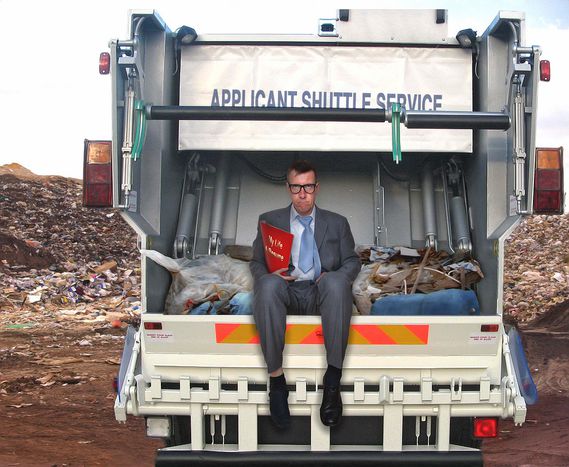
Money, jobs, growth, pacts - how EU tries to boost employment
Published on
Translation by:
ClaireWhiteAs of 18 October, the EU has engaged in talking ‘shop’. Between fighting large-scale unemployment and being in favour of positions created just to reach this goal or promoting the creation of ‘quality’ jobs, there's just one question: who’s going to do what?
We know the score. Boosting growth favours the creation of jobs. The stability and growth pact passed on 29 June 2012 sparked such talks on a European scale. Every state has its own employment model which is adapted to different political and historical ways of thinking (such asregional growth funds in the UK - ed).
But what is the collective European strategy for creating employment? More precisely, can there even be a European strategy for creating employment?

A pact looking to restore investors’ confidence is what is currently available. This will boost growth and employment and therefore preserve the monetary union. The issue of employment is particularly important since it directly affects European citizens, but it does present something more difficult to address. Possible European action consists of broadening the single market, which would be the motor of economic recovery (and therefore the creation of employment). So what’s next?
What the European commission has to say
In Jose Manuel Durao Barroso’s compact for growth and jobs report intended for all heads of state, guidance is offered to get the economic recovery project and the creation of jobs underway. Initiatives already set in motion by the EU are repeated, and the president of the European commission promises the reinforcement of their implementation.
For example, the 2020 strategy is largely shown as the most successful way of achieving the goal of creating jobs. In effect, this strategy anticipates a constituent linked to job markets aimed ‘to increase the number of jobs in Europe – more jobs, of higher quality, especially for women, young people and elderly workers; to help people of all ages, to foresee and manage changes by investing in skills and training; to modernise job markets and social welfare systems’ according to the European commission website.
This isn’t an isolated initiative. Barroso insists on the need to broaden the single market, in bringing down the remaining trade barriers and to promote growth and 'European employment'. He explains that we must 'connect Europe', by establishing an innovative union, investing in growth, notably in the private sector, and putting in place taxes on savings or on financial transactions as examples.
 Barroso also mentions the employment pact implemented by the European commission. In particular, it suggests the reinforcement of a European platform for recruitment and investment. They are no more than suggestions - and are often banking proposals. The initiatives of the 2020 strategy seem to fall apart from the beginning as the goals developed around 2007 - 2008 are now obsolete due to the consequences of the economic crisis. The employment pact only includes communication and exchange mechanisms that already exist. If the EU commission can only suggest uncertain solutions to the question of employment, what remains to be acted on at European level?
Barroso also mentions the employment pact implemented by the European commission. In particular, it suggests the reinforcement of a European platform for recruitment and investment. They are no more than suggestions - and are often banking proposals. The initiatives of the 2020 strategy seem to fall apart from the beginning as the goals developed around 2007 - 2008 are now obsolete due to the consequences of the economic crisis. The employment pact only includes communication and exchange mechanisms that already exist. If the EU commission can only suggest uncertain solutions to the question of employment, what remains to be acted on at European level?
What EU heads of state have to say
The European council (an institution comprising the EU heads of state, the head of the EU parliament and EU council - ed) should bring clarifications to the progress that has been made in terms of growth and employment; or whether the banking union has made a decision. No initiative has been taken with regard to employment.
The heads of state and government are drawing on observations from the European commission report. Nothing appears to have been added or decided. French president Francois Hollande notes that there had been an evaluation of the pact on behalf of the EU commission, the EU parliament and 'all of the institutions involved'. They have only touched on the tax on financial transactions, 'which is in no way unanimous,' declared Martin Schulz, president of the European parliament, as he made a speech at the European council. These ten countries have clearly expressed their desire to speed up the implementation of reinforced cooperation - France, Germany, Italy, Spain, Austria, Belgium, Greece, Portugal, Slovakia and Slovenia. This also allows them to pool some revenue for countries in difficulty or to establish a fund dedicated to youth training and therefore, employment. Suggesting the need to introduce society into the economic idea holds very evasive deciders.
What to make of employment in Europe
The creation of jobs is able to indirectly stimulate European action. Programmes such as erasmus or the European job mobility portal eures have certainly given priority to an exchange of intellectual knowledge and practices between different countries and have established a European professional mobility. In this respect, the European union can and must play a role facing unemployment. However, since it means adopting a concrete strategy to stimulate the creation of jobs in the private sector, and more so in the public sector, the EU remains powerless against national politics. Employment is still considered as a consequence of economic recovery and is therefore not addressed as a social problem. At this stage of European integration, and in this moment of crisis, the EU seems to have a dynamic necessity for employment, but without offering any sort of conclusion.
This article was first published on the official cafebabel Brussels blog which provided full coverage of the European summit on 18 and 19 October
Images: main (cc)david blackwell/ official site; in-text Martin Schultz (cc) european parliament; worker (cc) kugel/ all via flickr
Translated from L’UE peut-elle relancer l’emploi ?



